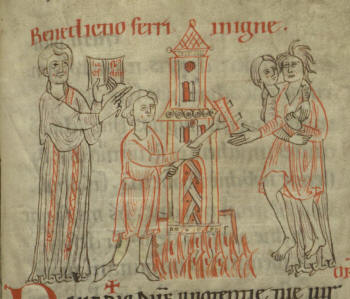<c.39> Nuls frans hom
ne sera pris, ne emprisonez, ne dessaisiz, ne ullagiez, ne
eissilliez, ne destruiz en aucune maniere, ne sor lui n'irons ne
n'enveierons, fors par leal
jugement de ses pers, o par la
lei de la terre (Nullus liber homo capiatur vel imprisonetur aut
disseisiatur aut utlagetur aut exuletur aut aliquot modo destruatur, nec
super eum ibimus, nec super eum mittemus, nisi
per legale iudicium
parium suorum vel per legem terre).
No free man shall be
taken or imprisoned or disseised or outlawed or exiled or in any way
ruined, nor will we move nor send against him, except by the lawful
judgment of his peers or by the law of the land.
Conradi II. Diplomata (Monumenta Germaniae Historica: Diplomata regum et imperatorum Germaniae 4; Hannover 1909; reprinted Munich 1980) p. 322, line 7-11: noted by Ullmann, Principles 162-163. Herwig Wolfram, Konrad II, 990-1039: Kaiser drei Reiche (Munich: 2000; English translation, University Park: Penn State University Press, 2010) 129.
Privileges from emperors Henry III (1028-1056), Henry IV (1056-1105), and Frederick I Barbarossa (1155-1190) repeated the same clauses word for word in their privileges.
